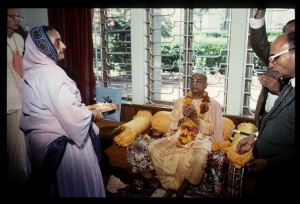CC Adi 4.165 (1975)

A.C. Bhaktivedanta Swami Prabhupada
TEXT 165
- ātmendriya-prīti-vāñchā--tāre bali 'kāma'
- kṛṣṇendriya-prīti-icchā dhare 'prema' nāma
SYNONYMS
ātma-indriya-prīti—for the pleasure of one's own senses; vāñchā—desires; tāre—to that; bali—I say; kāma—lust; kṛṣṇa-indriya-prīti—for the pleasure of Lord Kṛṣṇa's senses; icchā—desire; dhare—holds; prema—love; nāma—the name.
TRANSLATION
The desire to gratify one's own senses is kāma [lust], but the desire to please the senses of Lord Kṛṣṇa is prema [love].
PURPORT
The revealed scriptures describe pure love as follows:
- sarvathā dhvaṁsa-rahitaṁ
- saty api dhvaṁsa-kāraṇe
- yad bhāva-bandhanaṁ yūnoḥ
- sa premā parikīrtitaḥ
"If there is ample reason for the dissolution of a conjugal relationship and yet such a dissolution does not take place, such a relationship of intimate love is called pure."
The predominated gopīs were bound to Kṛṣṇa in such pure love. For them there was no question of sexual love based on sense gratification. Their only engagement in life was to see Kṛṣṇa happy in all respects, regardless of their own personal interests. They dedicated their souls only for the satisfaction of the Personality of Godhead, Śrī Kṛṣṇa. There was not the slightest tinge of sexual love between the gopīs and Kṛṣṇa.
The author of Śrī Caitanya-caritāmṛta asserts with authority that sexual love is a matter of personal sense enjoyment. All the regulative principles in the Vedas pertaining to desires for popularity, fatherhood, wealth and so on are different phases of sense gratification. Acts of sense gratification may be performed under the cover of public welfare, nationalism, religion, altruism, ethical codes, Biblical codes, health directives, fruitive action, bashfulness, tolerance, personal comfort, liberation from material bondage, progress, family affection or fear of social ostracism or legal punishment, but all these categories are different subdivisions of one substance-sense gratification. All such good acts are performed basically for one's own sense gratification, for no one can sacrifice his personal interest while discharging these much-advertised moral and religious principles. But above all this is a transcendental stage in which one feels himself to be only an eternal servitor of Kṛṣṇa, the absolute Personality of Godhead. All acts performed in this sense of servitude are called pure love of God because they are performed for the absolute sense gratification of Śrī Kṛṣṇa. However, any act performed for the purpose of enjoying its fruits or results is an act of sense gratification. Such actions are visible sometimes in gross and sometimes in subtle forms.